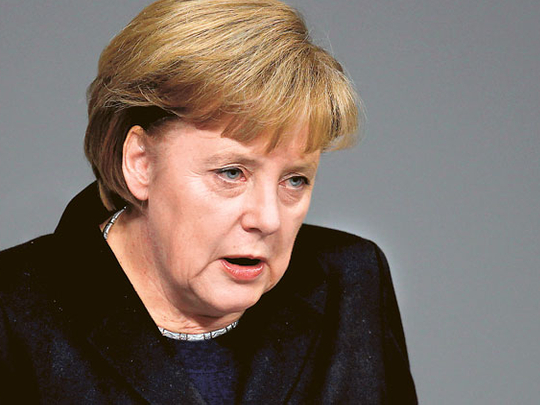
Berlin: A "disastrous" German bond sale yesterday sparked fears that Europe's debt crisis was even beginning to threaten Berlin.
One senior ratings agency official said the rise in its own borrowing costs could even give Germany a pause to re-examine its refusal to embrace a broader solution to resolve the debt crisis.
"It's quite telling that there has been upward pressure on yields in Germany - it might begin to change perceptions in Germany," David Beers of Standard & Poor's told an economic conference in Dublin.
The leaders of the Eur-ozone's two strongest economies remain firmly at odds over a longer-term structural solution to the debt crisis.
Financial markets were also unnerved by newspaper reports that Belgium may be pressing France for an expansion of a €90 billion (Dh451 billion) bailout of failed bank Dexia .
On top of this, a special report by Fitch Ratings suggested France had limited room left to absorb shocks to its finances like a new downturn in growth or support for banks without endangering its cherished AAA credit status.
After one of the least successful debt sales by Eur-ope's powerhouse economy since the launch of the single currency, the euro fell and European shares sank to seven-week lows.
The Bundesbank was forced to retain almost half of a sale of €6 billion due to a shortage of bids by investors. The result pushed the cost of borrowing over 10 years for the bloc's paymaster above those for the United States for the first time since October.
"It is a complete and utter disaster," said Marc Ostwald, strategist at Monument Securities in London.
The new bond promised to pay out a 2.0 per cent interest rate — the lowest ever on an issue of German 10-year Bunds. The average yield at the auction was 1.98 per cent, down from 2.09 per cent at the last sale of the previous benchmark in October.
Signs that European banks are increasingly shut out of credit markets and reliant on the European Central Bank for funding have added to pressure for the bloc's leaders to find a broad and lasting solution to the crisis.
But Germany and France clashed again over whether the ECB should take bolder steps to ease the pressure on debt markets in Italy, Spain and others which is now at the heart of the crisis.
Chancellor Angela Merkel yesterday issued one of her starkest warnings yet against fiddling with the central bank's strict inflation-fighting mandate and hit back at proposals from the European Commission on joint Eurozone bond issuance, calling them "extraordinarily inappropriate".
French Finance Minister Francois Baroin offered a polar opposite view on the ECB's role, telling a conference in Paris that it was the central bank's responsibility to sustain activity in the currency bloc.
Manufacturing
Europe orders fall 6.4%
Europe reeled yesterday after the worst month-on-month manufacturing data since December 2008 showed that new orders plunged by 6.4 per cent compared with August, according to Eurostat, the European Union's statistical office.
September's figures added to evidence that the Eurozone has fallen into recession. Italy, where the debt crisis intensified from August, saw the biggest drop in industrial orders - of 9.2 per cent - between August and September. But France and Spain saw drop of 6.2 per cent and 5.3 per cent respectively, and Germany saw a 4.4 per cent contraction in orders.
US stocks sank in early trading, dragging the Standard & Poor's 500 Index lower for a sixth straight day, and costs to insure European government debt rose to a record after the German bund auction fuelled concern the debt crisis is worsening. The S&P 500 lost 1.7 per cent to 1,168.19 in New York, while the MSCI Emerging Markets Index fell for a seventh day in its longest slide since 2009.
— Reuters












